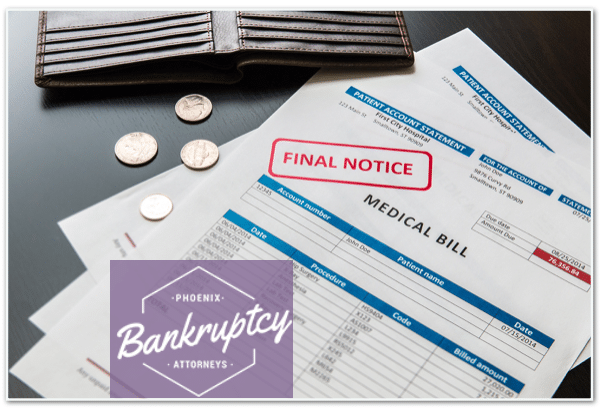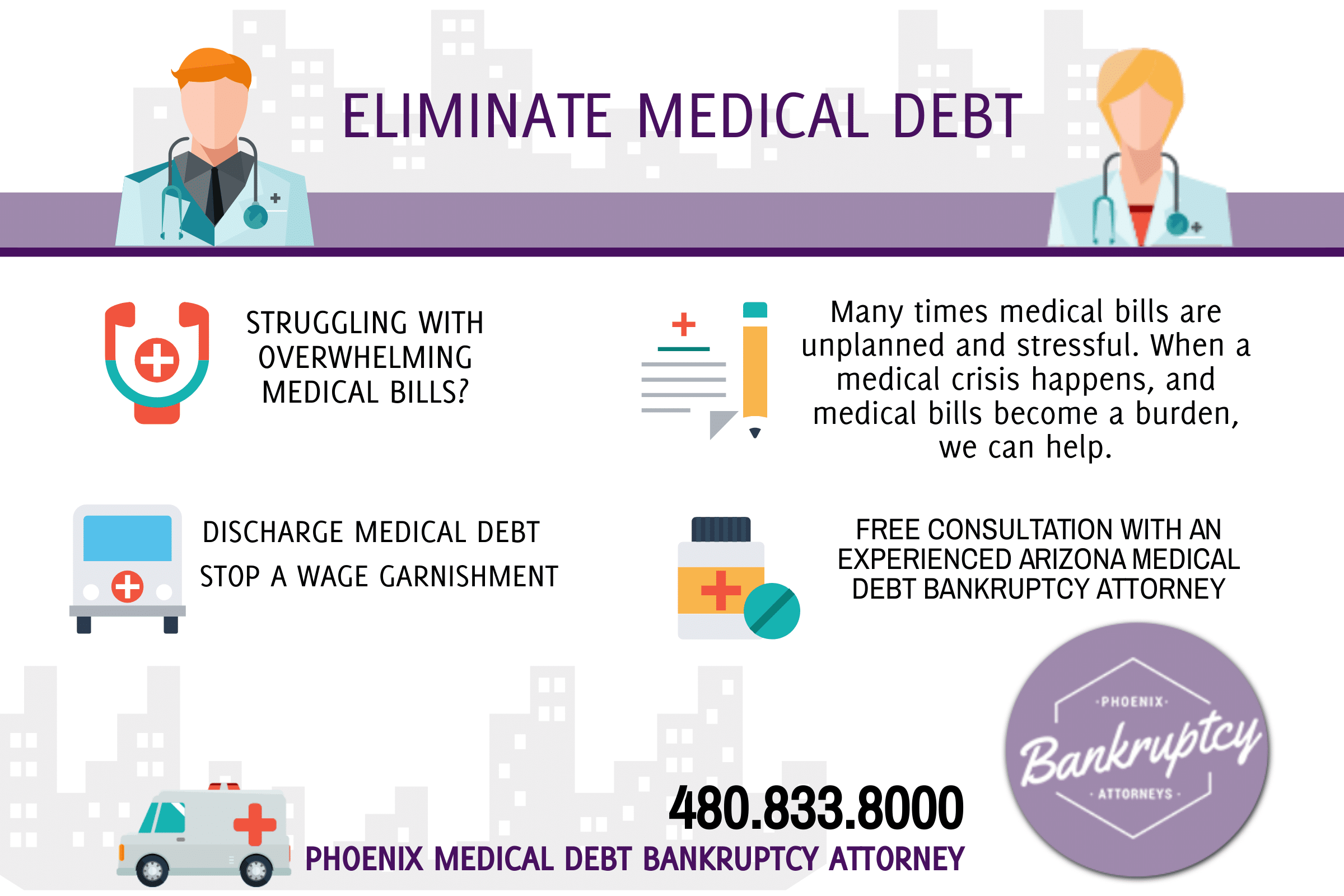Medical Debt Bankruptcy in Arizona
 If you’ve ever experienced a serious illness or injury, you probably know just how expensive it can be to receive proper medical treatment. This can be said whether or not you have health insurance coverage to help with your medical expenses. So what can you do if you are left with unmanageable debt after a medical emergency? Bankruptcy is available as a safety net to those who qualify under Chapter 7 Bankruptcy or Chapter 13 Bankruptcy. Contact our Phoenix Bankruptcy Lawyers to learn more about how to wipe away Medical Debt and Doctor’s Bills through filing bankruptcy in Phoenix.
If you’ve ever experienced a serious illness or injury, you probably know just how expensive it can be to receive proper medical treatment. This can be said whether or not you have health insurance coverage to help with your medical expenses. So what can you do if you are left with unmanageable debt after a medical emergency? Bankruptcy is available as a safety net to those who qualify under Chapter 7 Bankruptcy or Chapter 13 Bankruptcy. Contact our Phoenix Bankruptcy Lawyers to learn more about how to wipe away Medical Debt and Doctor’s Bills through filing bankruptcy in Phoenix.
When filing bankruptcy due to medical debts, many people refer to this as a “medical bankruptcy.” However, there is technically no such thing as a “medical bankruptcy.” Even if your debt strictly stems from an illness or injury, you will still need to file a standard Chapter 7 or Chapter 13. All of your debts will be included in your bankruptcy, even if you file for medical reasons. This is to ensure fairness to both debtors and creditors.
Is Medical Debt Dischargeable in Bankruptcy?
Medical debt is generally unsecured debt. In a bankruptcy context, this means it is the same as credit cards, unpaid utility bills, repossession deficiencies, and personal loans. That means if you have any of these types of debts and file bankruptcy to discharge medical debt, the rest of your unsecured debts will be categorized and treated the same way. They will be liquidated and discharged in a Chapter 7 bankruptcy, and paid in the lowest tier of debts in a Chapter 13 payment plan.
As convenient as it would be, you can’t pick and choose the debts you include in your bankruptcy. You must list all of your debts, real estate, and personal property in your bankruptcy petition. You will also need to list your household income and all of your family’s expenses. This is true whether or not your spouse files bankruptcy with you. Other personal information must be included, like marital status, recent property transfers, impending settlements or inheritances, and more.
There are two main forms of consumer bankruptcy– Chapter 7 and Chapter 13. They will stay on your credit for ten and seven years, respectively. You will also be disqualified from FHA loans for 2 years after filing either chapter. However, you should be able to finance assets and open new credit cards shortly after your bankruptcy.
MEDICAL DEBT FREQUENTLY ASKED QUESTIONS
Post-Filing Plans
If paying your fees up front is infeasible, your bankruptcy attorney may offer a post-filing payment plan. Depending on your income and the chapter you seek to file, you could be filed with little to no money down. You should confirm with your attorney whether or not your filing fees will be included in your payment plan, as some may offer payment plans for legal fees, but require you to pay your filing fees up front. The filing fees for a Chapter 7 bankruptcy are $338. For a Chapter 13 bankruptcy, the filing fees are $313.
 In a Chapter 13 bankruptcy, your legal fees will be worked into your payment plan. In a Chapter 7, your case must be bifurcated in order to pay your fees after filing. This means your case will first be filed as a skeleton petition. This “bare bones” petition only includes basic contact information, your income information, and your creditor mailing matrix. Once that petition is filed, you can begin accruing debt again. Your attorney will charge for work that has been completed after your skeleton petition is filed- completing and filing your standard petition, attending your 341 Meeting of Creditors, etc. Your payment plan will represent your costs for these services.
In a Chapter 13 bankruptcy, your legal fees will be worked into your payment plan. In a Chapter 7, your case must be bifurcated in order to pay your fees after filing. This means your case will first be filed as a skeleton petition. This “bare bones” petition only includes basic contact information, your income information, and your creditor mailing matrix. Once that petition is filed, you can begin accruing debt again. Your attorney will charge for work that has been completed after your skeleton petition is filed- completing and filing your standard petition, attending your 341 Meeting of Creditors, etc. Your payment plan will represent your costs for these services.
One benefit of filing with a post-filing payment plan is that your payments could actually help you improve your credit after bankruptcy. Confirm with your attorney that your plan will include credit reporting. While failing to make your payments after bankruptcy will hurt your score, timely payments will slowly and steadily help you build a new positive credit history. You should look for a post-filing payment plan with a 0% interest rate. Whenever possible, your attorney should give you the option of picking your own payment dates and frequencies. Most often, your balance must be paid off within 12 months of filing.
Considering a Medical Debt Bankruptcy in Arizona?
If you’re considering bankruptcy in Arizona due to medical debt, you’re not alone- medical bills are actually the leading cause of bankruptcy in the United States. Even with years of careful budgeting and financial planning, a medical emergency can create debt that would be impossible for you to escape on your own. Don’t assume that you are out of options. Bankruptcy could be the relief you need to clear away debts and start a new financial future.
Our Arizona bankruptcy lawyers have the knowledge and experience to guide you through a bankruptcy as quickly and painlessly as possible. If there is a better solution for you, our lawyers will help you find it. If bankruptcy is appropriate, we offer affordable rates and payment plan options starting at zero dollars down to get you filed. For more information, call or use our online form to schedule your free case evaluation today.
File Now … Pay Later!
Phoenix bankruptcy attorneys serving Chapter 7 and Chapter 13 clients in Phoenix and surrounding communities!
